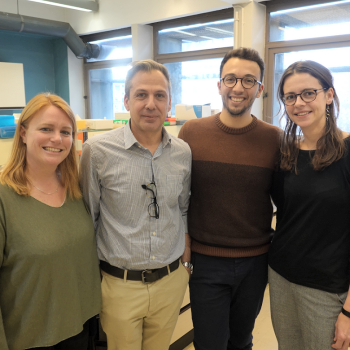Towards a better understanding & treatments of triple negative breast cancer
Press release (19/12/2019)
Towards a better understanding of triple negative breast cancer and new treatment strategies
Brussels, December 19th, 2019 – In an article that was published recently in the Journal of the National Cancer Institute, the Breast Cancer Translational Research Laboratory at the Jules Bordet Institute highlighted for the first time the heterogeneity of the tumour microenvironment and immune system in triple negative breast cancers. This research is aimed at improving the treatment available to patients suffering from this kind of cancer for which the prognosis is often unfavourable.

Triple negative breast cancer: a heterogeneous disease
Triple negative breast cancer, which represents between 15% and 20% of all breast cancers, is defined by an absence of expression in the tumour cells of the oestrogen and progesterone receptors as well as the absence of HER2 gene overexpression or amplification. The prognosis for this type of breast cancer is more unfavourable than for other breast cancer subtypes. Despite the major progress made in treating other breast cancer subtypes, the treatment options for triple negative breast cancer remain limited. This is why various studies have looked at how to improve our understanding of the biology of this type of cancer. In a recent study based on the analysis of 500 patients, the team headed by Professor Christos Sotiriou of the Bordet Institute showed, among other things, that triple negative breast cancer is a heterogeneous disease including at least five molecular subtypes characterised by specific gene mutations and expression profiles. Despite this better characterisation of triple negative breast cancer, treatment strategies remain limited.
Heterogeneity of tumour microenvironment and immune system
The tumour microenvironment, and in particular that of immune cells, is an important factor in the response to immunotherapy that aims to reactivate the immune response of patients to cancer cells. In this connection, Professor Christos Sotirou’s team deepened its study of triple negative breast cancer by characterising at the molecular level the microenvironment of each subtype of triple negative breast cancer. In particular, they studied the expression of the various immune system markers targeted by current immunotherapy treatment as well the various biological processes such as the vascularisation or metabolism of the tumour microenvironment. These processes may influence the response to immunotherapy and permit a better identification of patients who may benefit from this kind of treatment. This study, carried out on a cohort of more than 1500 patients, shows that each molecular subtype exhibits different tumour microenvironment profiles as well as specific immune composition and localisation. There are three different subgroups depending on the lymphocyte localisation in relation to the tumour cells. In the first subgroup the lymphocytes enter into direct contact with the tumour cells. Patients exhibiting this type of tumour with a totally “inflamed” spatial pattern are those for whom immunotherapy could prove most effective. For the two other subtypes the lymphocytes do not succeed in entering into contact with the tumour cells and remain either in the tumour stroma or outside of it. In these cases the aim would be to develop new treatment strategies making it possible to recruit and activate the lymphocytes.
Towards new treatment strategies
The results of this new study published in the JNCI pave the way for the rational development of new immunotherapies that are specific to each molecular subtype of triple negative breast cancer, thereby permitting improved treatment for patients.
- Press contact (Institut Jules Bordet)
- Alexandra Cazan
- GSM : +32 (0)493 16 74 79
- Email : alexandra.cazan@bordet.be
- Alexandra Cazan
To download
- Vers une meilleure compréhension du cancer du sein triple négatif et de nouvelles stratégies thérapeutiques401.09 KB
- Naar een beter begrip van triple negatieve borstkanker en nieuwe therapeutische stategieën385 KB
- Towards a better understanding of triple negative breast cancer and new treatments strategies444.83 KB